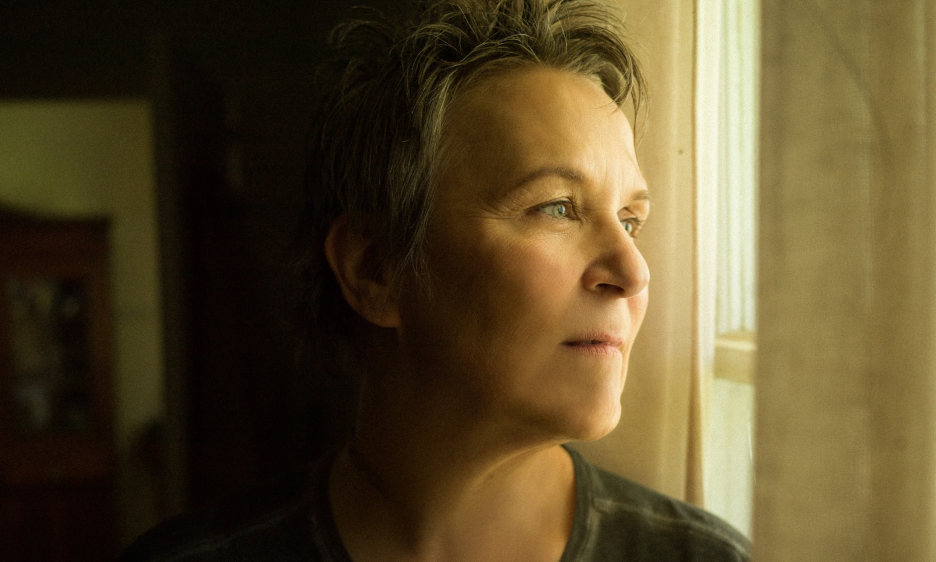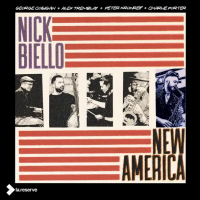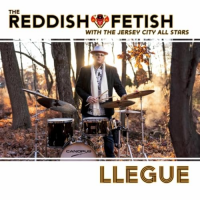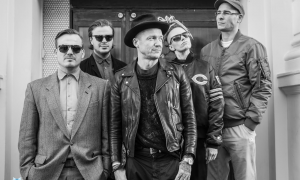Home » Jazz Articles » Live Review » Mary Gauthier at The Freight and Salvage
Mary Gauthier at The Freight and Salvage

The Freight and Salvage
Berkeley, California
June 12, 2025
"A song can change a heart by creating empathy. A changed heart has the power to change a mind. And when a mind changes, a person changes. When people change, the world changes. One song, one heart, one mind, one person at a time. Songs can bring us a deeper understanding of each other and ourselves and open the heart to love." —Mary Gauthier, Saved By a Song: The Art And Healing Power of Songwriting (St. Martin's Publishing Group, 2021)
There are singer-songwriters—and then there is Mary Gauthier. What sets her apart? First of all, her remarkable life story. Adopted by a Catholic family in Louisiana, she ran away from home at 15. She carved out a hardscrabble existence and eventually spent 11 years running the Dixie Kitchen, a Cajun restaurant located next to Boston's Berklee Performance Center. Ready to move on, she had her partners buy her out, which allowed her to self-publish Drag Queens and Limousines (In The Black Records, 1999), her second effort, which became a huge hit. Things just exploded. Gauthier went from $50-a-night gigs at coffeehouses to main stage at the Newport Folk Festival, and, then, in turn, to the Strawberry Music and the Festival, Rocky Mountain Folk Festival. It has been a slow but sure upward trajectory since then.
Another thing that sets Gauthier apart is that she can take a year to finish a song lyric; each undergoes hundreds of rewrites. The hard work shows up in the way the lyrics really shine. She has not gone without help: Mentors include Taj Mahal and the late John Prine, who took her on tours with him. Being blessed with a sonorous voice and an affable, outgoing stage persona all add to her considerable appeal. Piquant comments such as "The medical profession really does not respect women" are a welcome plus.
Waco, Texas-native Jaimee Harris—Gauthier's longtime partner singer-songwriter—kicked off the evening. She was colorfully clad in a red Western-style hat, red heart-shaped sunglasses, red earrings in the shape of Texas, red nail polish, red dress, and red-and-white cowboy boots and guitar strap. The talkative and ebullient Harris gave an impressive half-hour performance, which included her poignant song "Orange Avenue," penned in tribute to the 2016 Pulse Nightclub shooting victims.
Taking the stage and accompanied by Harris on backing vocals and guitar, Gauthier launched into the first song of the evening: "Between the Daylight and the Dark," a song she crafted with Canadian singer-songwriter (and mentor) Fred Eaglesmith; it is the title song of her 2007 album. "And the front porch flags lie themselves down / Like forgotten soldiers and old wedding gowns / In closets unopened and graves without any marks."
The evocative, masterfully-penned "Meet Me in the Meadow" followed. "Won't you meet me in the meadow? / We can look up at the stars / Lean into the wind / Dream again / Find out who we are." Next was "Thank God for You": "I was just another junkie jonesing on a Greyhound bus / With a 20-year ticket to a tortured mind / Sirens, sorrow, cigarette butts / My Jesus in pieces, broken as the highway lines."
Gauthier's tour commemorated the 25th anniversary of the release of her aforementioned seminal album Drag Queens and Limousines. Before launching into the title track, Gautier related that the tour had gone on long enough that it was now 26 years since its release. "I Hated High school, I prayed it would end. /The jocks and their girls it was their world / I didn't fit in./ Mama said, "Baby, it's the best school that money can buy / Hold your head up, be strong, c'mon Mary, try." / I stole mama's car on a Sunday and left home for good / Moved in with my friends in the city, in a bad neighborhood."
Her classic "I Drink," one of the songs which have cemented her acclaim, followed. Contrary to what one might intuit from the title, Gauthier told us that she penned it post sobriety; it's an imagining "of what might have happened if I had not stopped drinking."
Gauthier then read a few pages from her autobiography Saved by a Song, before launching into a long-winded explanation of how she came to write "Some Times" with Vince Gill. The song is about a worker on the "Orange Blossom Special," a Florida-bound luxury liner than ran from New York City to Miami, Florida from mid-December to mid-April from operated from mid-December through mid-April from 1925 until 1953, when the interstate was completed and the reign of the car caused its demise. Train car colors mimicked those of lemons, limes and oranges. Gauthier's poignant song imagines the thoughts of an elderly former workman on the train concerning his life experiences and his hopes for a better future for all.
Strapping on her harmonica, she told us that "Last of the Hobo Kings," was about Maurice W. Graham, also known as Steam Train Maury, who was considered to be "King of the Hobos" and later was regarded as the "Patriarch of the Hobos." Gauthier related that "He had the kind of eyes that hetero women fall into against their will." As with "Some Times," the lyrics reflect a wistful sadness about things past and once available opportunities restricted: "Boxcars have been sealed for years And trespassers do time / And the railroad yards are razor wired / And hoboing is a crime"
One surprise came with her rendition a new song, a Dave Alvin-style short story in verse, which has the enticing title of "Alcohol and Adderol." Written with Harris and Ben Robertson, it contains phrases "came up to my room when she was high." And "the damage done."
Following the reading of another passage from her autobiography Gauthier talked about her Grammy-winning Rifles & Rosary Beads album (In The Black Records, 2018) which came to fruition as a result of her work with the SongwritingWith:Soldiers organization which, since 2012, has held weekend retreats across the U.S. for veterans of every conflict. Songwriters work together with veterans to create songs from their stories, and it proved to be a formative experience for Gauthier. "When one member serves, the whole family serves. There is a war after the war."
She then played "The War after the War": "Who's gonna care for the ones who care for the ones who went to war? / Land mines in the living room / eggshells on the floor / I lost myself in the shadow of your honor and your pain / You stare out the window as our dreams go down the drain / Invisible, the war after the war."
Admiring the cover of her album projected above her (which depicted the white outline of semi-animated boat set against black), she told us that she has been playing at the Freight for 26 years, and "this is the largest crowd I have drawn." She began "Dark Enough to See the Stars," the title song to her eponymous album; the title is drawn from the sentence "I know, somehow, that only when it is dark enough can you see the stars." from a speech Martin Luther King Jr. gave on April 3, 1968, just a day before his assassination.
She concluded the evening with her mournful "Mercy Now" : "We all could use a little mercy now / I know we don't deserve it / But we need it anyhow / We hang in the balance / Dangle 'tween hell and hallowed ground / And every single one of us / Could use some mercy now."
For an encore, Gauthier picked "Wheel Inside the Wheel," her tune recorded by Jimmy Buffett: "Souls ain't born / Souls don't die / Soul ain't made of earth / Ain't made of water / Ain't made of sky / Ride the flaming circle / Wind the golden reel / Roll on brother."
Tags
Live Review
Mary Gauthier
Harry S. Pariser
United States
California
san francisco
John Prine
Jaimee Harris
Fred Eaglesmith
Ben Roberts
Jimmy Buffett
PREVIOUS / NEXT
Support All About Jazz
 All About Jazz has been a pillar of jazz since 1995, championing it as an art form and, more importantly, supporting the musicians who make it. Our enduring commitment has made "AAJ" one of the most culturally important websites of its kind, read by hundreds of thousands of fans, musicians and industry figures every month.
All About Jazz has been a pillar of jazz since 1995, championing it as an art form and, more importantly, supporting the musicians who make it. Our enduring commitment has made "AAJ" one of the most culturally important websites of its kind, read by hundreds of thousands of fans, musicians and industry figures every month.
Go Ad Free!
To maintain our platform while developing new means to foster jazz discovery and connectivity, we need your help. You can become a sustaining member for as little as $20 and in return, we'll immediately hide those pesky ads plus provide access to future articles for a full year. This winning combination vastly improves your AAJ experience and allow us to vigorously build on the pioneering work we first started in 1995. So enjoy an ad-free AAJ experience and help us remain a positive beacon for jazz by making a donation today.Near
San Francisco Concerts
Feb
18
Wed





























